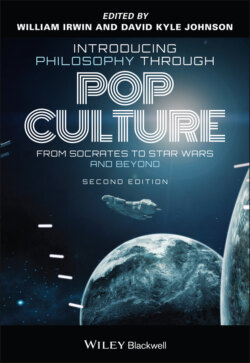Читать книгу Introducing Philosophy Through Pop Culture - Группа авторов - Страница 33
My Truth (Individual Relativism)
Оглавление[My book is] not just some collection of reasoned arguments supported by facts. That is the coward's way out. This book is Truth. My Truth.
– Stephen Colbert
From the introduction to I Am America (And So Can You!) 14
His use of the phrase “My Truth” was the first clue that Colbert was kidding. He was suggesting that, somehow, truth belongs to him and can be solely determined by him. In doing so, Colbert was espousing a naive “individual relativism.” In general, relativism says that there are no truths in a universal sense; truth is relative. More specifically, individual relativism says that truth is relative to individuals. But to understand what this means, and why the real Colbert cannot possibly be an individual relativist, some questions need answering.
If truth is relative, what is truth? Truth is a property of beliefs and propositions. (“Proposition” is a term the wordinistas came up with because “sentence” wasn't good enough.) A belief or proposition is true if it corresponds to the way the world is; it is false if it does not. Philosophers call this “the correspondence theory of truth.” The part of the world that a true belief or proposition corresponds to is called that proposition's “truthmaker” – it is the part of the world that makes that proposition or belief true.
What does it mean for a truth to be relative? This is a question best answered by example. “You should drive on the right side of the road.” This truth is relative to culture; it is true in the United States but false in the United Kingdom. There is no universal truth about what side of the road you should drive on – it's a matter of convention. The truth of “Baconnaise tastes great” is relative to individuals. One person thinks it's true, and another thinks it's false, but neither one is right or wrong because there is no universal fact of the matter about it. Or consider whether Colbert's The Late Show is funny. You think he's hilarious; your mother does not get it: but neither of you is wrong or right (but, between you and me, your mom is wrong).15
The individual relativist thinks all truths are like this, but obviously this cannot be the case. For example, whether or not you exist is not a matter of convention or taste. If someone believes that you do not exist, it is not “true for them.” Your existence is a matter of fact. They might believe you do not exist, sure, but their belief is false. In addition, individual relativism in this form is self‐contradictory. It says there are no universal truths. But is not the individual relativist trying to establish that individual relativism is universally true? How can it be universally true that there are no universal truths? And, since something is true if it corresponds to the way the world is, if there were no universal truths there would be no world. The only way everything can be relative is if nothing exists to make any proposition universally true. And that's crazy!
Some individual relativists do not think everything is relative, just some things. For example, some people think only moral truths are relative to individuals. Is abortion immoral? The individual relativist would say that, for people who believe abortion is wrong, it is wrong – “wrong for them.” But for people who do not think abortion is wrong, it is right – “right for them.” Because moral questions, like the abortion question, are often very hard to answer, this is a very tempting line to take. Whatever each person thinks is the right answer, is the right answer for that person.
But individual relativism has harrowing consequences if true. If individual relativism was true, being racist or white supremist would be the morally acceptable attitude for a neo‐Nazi, Proud Boy, or Oath Keeper to take. Killing people and eating them would be morally acceptable for Jeffery Dahmer. That such things are morally acceptable would be “true for them.” I think it safe to assume, not very many people are going to agree. Disagreements from racists and the cannibals cannot make racism and murderous cannibalism right.
So Report‐Colbert cannot have really believed that his book, I Am America (And So Can You!), was “his Truth.” It might be a collection of opinions he thought were true, but that does not make those opinions “Truth.”
